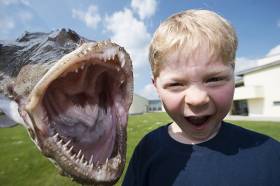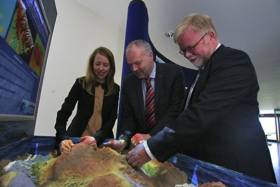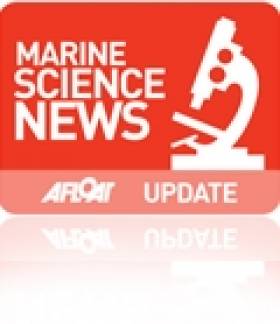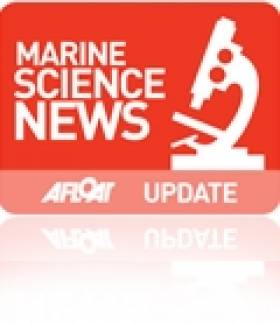Displaying items by tag: Blue Economy
'Blue Economy' Focus By Government
Marine Minister Creed officially opens third national marine (Ocean Wealth) conference and launches third Progress Report on Implementation of Harnessing Our Ocean Wealth today.
The Minister outlined the Government’s continued commitment to blue growth and implementation of Harnessing Our Ocean Wealth –Ireland’s Integrated Marine Plan. Addressing more than 500 international and national industry leaders, policy makers, researchers and maritime entrepreneurs at the third annual ‘Our Ocean Wealth’ Conference today, in the National University of Ireland, Galway,
Speaking at the conference today Minister Creed said:
“Ireland’s marine sector is a vibrant part of our national economy and we have seen significant growth in our ‘blue economy’. This transformation is being brought about by the commitment and hard work of various State agencies, Government Departments, relevant stakeholders and investors.
“I am delighted to announce the publication of the third Progress Report on Ireland’s Integrated Marine Plan Harnessing Our Ocean Wealth published by the Government in 2012. The Report sets out the considerable recent progress achieved in implementing the ambitious targets and actions outlined in the Plan and I would like to thank everyone for their continued commitment to its implementation.
The conference, which is an opportunity to reflect on the progress and achievements in implementing Harnessing Our Ocean Wealth included contributions from Minister Creed, Minister Coveney, Minister Naughten and Minister of State Kyne.
Minister Creed stated “This Government will continue to work with the sector’s stakeholders, we will build on the success of recent years and continue to implement Harnessing Our Ocean Wealth – which aims to double the value of the blue economy by 2030 and deliver 29,000 additional jobs across the maritime sector and wider economy.”
Guided by the theme “Into the Blue – Innovating for our Marine Future” the conference focused on how Ireland can innovate in three target areas of Harnessing Our Ocean Wealth, namely: A Thriving Maritime Economy, Healthy Ecosystems and Engagement with the Sea. Key speakers included Mary L. Shelman, global food and agri-food thought leader, European Commission DG Research Head of Marine Resources Sigi Gruber, Gerald Fleming of Met Eireann, Craig McLean, US National Ocean & Atmospheric Administration and Linda Rosborough of Marine Scotland.
Creating an infrastructure to support the blue economy is critical to the success of Ireland’s integrated marine plan. A key infrastructural element to support the maritime sector was also officially launched at the conference by Minister Creed – the SmartBay Subsea Observatory has now started streaming high speed data from the seabed at Galway Bay to businesses, researchers, scientists and policy makers across the internet. Supported by the Marine Institute, Sustainable Energy Authority of Ireland (SEAI) and Science Foundation Ireland, the observatory will be used to collect valuable data from the ocean and will be a critical component of a world-class maritime infrastructure in Ireland.
Welcoming the launch of the Data Observatory, the Minister for Skills, Training and Innovation, John Halligan T.D. said , “This new infrastructure will play a key role in developing and testing the technologies necessary to unlock the economic potential of our Atlantic coast. It will drive innovation in SMEs and multinational companies in the ocean energy sector. I am particularly pleased that Science Foundation Ireland has supported this infrastructure with an award of €2.2 million, under its Research Infrastructure Programme, to fund the subsea cable providing power and data connectivity to the test site”.
Other announcements included the establishment of a dedicated Marine Development Team involving major development agencies of the state in an integrated inter agency based approach to delivering further development of the blue economy.
Minister Creed added that “The Marine Development Team which will make recommendations to the cross Departmental Marine Coordination Group, will be coordinated by the Marine Institute. I look forward to this talented team bringing a further collaborative, cohesive and cutting edge approach to growing Ireland’s Blue Economy and augmenting the positive inter agency work of recent years.”
Harnessing Our Ocean Wealth and Seafest are initiatives of the Inter-Departmental Marine Coordination Group. The conference as well as a range of industry and innovation events are taking place in Galway as part of SeaFest from 30th June -3 July. A wide range of public events are also taking place in Galway Harbour this weekend (July 2-3) as part of SeaFest which supports a key goal of Harnessing Our Wealth – An Integrated Marine Plan - engaging with the Sea.
#OurOceanWealth - Industry leaders, policy makers, researchers and maritime entrepreneurs will come together for the third Our Ocean Wealth conference on Friday 1 July in NUIG to discuss marine innovation, marine spatial planning, healthy ocean ecosystems and sustainability, the Marine Institute announced today (Tuesday 7 June).
The theme of this year's conference is 'Into the Blue – Innovating for our Marine Future', and key speakers include Vice Admiral Mark Mellett, head of the Irish Defence Forces; European Commission director general and research head of marine resources Sigi Gruber; Gerald Fleming of Met Éireann; Craig McLean of the US National Ocean & Atmospheric Administration; and Linda Rosborough of Marine Scotland.
New Marine Minister Micheal Creed will also give his first formal address on the marine economy at the conference.
"This conference will be an opportunity to reflect on the progress and achievements in implementing Harnessing Our Ocean Wealth – An Integrated Marine Plan for Ireland," he said. "I'm looking forward to hearing from thought leaders and innovators across a broad and exciting maritime sphere and to join the discussion on innovating for our marine future."
Speaking at the launch of the conference schedule, Marine Institute CEO Dr Peter Heffernan said: "While there are many events internationally that look at specific areas of our marine economy, from shipping and transport to energy, the Our Ocean Wealth annual conference is unique in that it brings global experts in this industry together to discuss the future opportunities and challenges for the blue economy.
"This holistic approach to the global maritime economy, and our focus on Ireland's blue economy, makes it a must-attend event for anyone working in or involved in marine-related activities."
Delegates will also hear from Irish companies leading in innovation such as OpenHydro Group Ltd, which has just installed its second tidal turbine off the north west coast of France due to connect to the grid this summer, in what will be a world first for the tidal energy industry.
Several hundred people are expected to attend the Our Ocean Wealth conference, which is being held in Galway this year as part of SeaFest, Ireland's national maritime festival, from 30 June to 3 July.
A number of other blue economy events are also taking place to coincide with the conference, including a Sea Change Researchers Workshop at the Marine Institute, the Digital Ocean event at the Meyrick Hotel and the BIM National Seafood Conference which all take place on Thursday 30 June.
Ireland Needs Reliable 'Blue Growth' Stats As Marine Sector Outperforms General Economy, Spurs Innovations
#MarineIndustry - With Ireland's maritime industry definitively outperforming the general economy since the global financial crisis began, "reliable statistics" on the sector are needed to understand how the health of our waters and coastline affects the country as a whole.
That's the impetus behind new research being conducted by the Socio-Economic Marine Research Unit (Semru) at NUI Galway, together with Teagasc, to determine the indirect impact of Ireland's marine economy on the country's broader growth, as the Irish Examiner reports.
The collaboration has already produced what they call the Bio-Economy Input-Output Model, which studies the connections between Ireland’s marine and agriculture sectors and the rest of the economy – and has indicated that for every €100 in marine sector turnover, another €78 is generated across other economic sectors.
With those kinds of results, it's no surprise that Ireland's waters and coastline are being embraced as "a national asset providing incredible opportunities for tourism, energy, food and new applications for therapeutics and technology,” according to Marine Institute chief executive Dr Peter Heffernan.
“We’re building marine research infrastructure that will support and promote the development of the technology we need to harness that energy," he added. "We’re in an ideal position to become a leader in the development of ocean energy technology.”
Indeed, this prime time for Ireland's renewable energy potential was the spur for a UCC spin-out company to license a new financial modelling and analytics tool for the offshore wind and tidal power sectors.
Exceedence Ltd, founded and led by Dr Ray Alcorn, will now bring to market the ExceedenceFINANCE solution, developed by software engineers, financial analysts, industry specialists and researchers in the Marine Renewable Energy Ireland (MaREI) centre at UCC Beaufort.
“Our software analyses the viability of potential renewable projects and helps to make intelligent decisions on where and when these projects should proceed," explains Dr Alcorn.
The software is designed to help "a wide range of stakeholders" from State agencies, investors, engineers and developers "to create renewable energy infrastructure that can address the need for low or no-carbon energy within Ireland and abroad", according to University College Cork’s VP of research and innovation, Prof Anita Maguire
"This technology is very significant for the blue economy, in Ireland and internationally. We are delighted to see Exceedence develop commercially with the objective of supporting the marine industry and ultimately creating jobs.”
#BlueEconomy - Marine Minister Simon Coveney launches the latest report on Ireland's Ocean Economy at the second annual Ocean Wealth Conference, taking place in Ringaskiddy, Cork today (Friday 10 July) as part of Ireland's national maritime festival SeaFest.
The report, compiled by NUI Galway's Socio-Economic Marine Research Unit (SEMRU) and Teagasc, estimates that the sector contributed an estimated €1.4bn to GDP last year.
As per Minister Coveney's address to the conference, Ireland's 'Blue Economy' is performing on average better than the general economy with up to 9% growth over the last five years.
With an estimated turnover of €4.5bn, the sector employs approximately 18,500 full-time equivalents and new data from shows that in addition to the direct impacts of Ireland's ocean economy, a further 13,000 are employed across the wider economy providing an additional €3.3bn in turnover.
This marks the third report on Ireland's Ocean Economy from NUI Galway's SEMRU as part of its ongoing process of collection and analysis of marine socio-economic data in Ireland funded by the Marine Institute.
Results from the report show trends in Ireland's Ocean Economy over the period 2010-2012 and provides an estimate of the direct value in 2014.
Speaking ahead of the conference, Minister Coveney said: "Over the past few years we've seen a dramatic and in some cases radical transformation in Ireland's attitude towards the marine sector generally, with the marine now being viewed as a significant contributor to our economic recovery.
"This new data from SEMRU and Teagasc shows that Ireland's blue economy is performing well in established industries such as seafood, shipping and marine tourism, and is excelling in emerging industries such as high-tech marine products and services, marine biotechnology and maritime commerce."
Summary of direct economic impacts:
• The ocean economy had a turnover of €4.2 billion in 2012, rising to an estimated €4.5bn in 2014.
• The ocean economy provided employment for 17,425 individuals Full Time Equivalents (FTEs) in 2012, with an estimated increase to 18,480 in 2014.
• Over the period 2010-2012 a 33% increase in turnover is reported, a further increase of 7% is estimated for the period up to 2014. Employment has also steadily risen, with increase of 5-6%.
• Top three marine sectors in terms of employment (FTEs): Marine Tourism & Leisure (6,000 FTEs); Seafood & Bioresources: Fisheries, Aquaculture, Seafood Processing, Biotech/Seaweed (over 5,600 FTEs); Shipping & Maritime Transport including international shipping services (over 4,100 FTEs)
• Top three marine sectors in terms of Turnover and Gross Value Added (GVA): Shipping & Maritime Transport including international shipping services (€2.2bn turnover, €0.5bn GVA); Seafood (€1bn turnover, €0.4bn GVA); Marine Tourism & Leisure (€0.7bn turnover, €0.3bn GVA)
• Established marine industries represent 95% of the total turnover and 93% of total employment in Ireland's ocean economy. Marine retail services, sea fisheries and seafood processing, all experienced a significant increase in activity, with turnover, GVA and employment increasing across the sector in the period. The aquaculture sector also exhibited increases, albeit of a smaller scale, across all three variables.
• Emerging marine industries representing 5% of the turnover and 7% of employment in Ireland's ocean economy. In comparison to the established industries, the emerging industries are excelling in terms of growth. High tech marine products and services, marine biotechnology and bio-products and marine commerce experienced large increases in turnover, GVA and employment. Marine renewable energy experienced a more moderate increase in turnover but a large increase in GVA. In terms of employment, however, the marine renewables sector experienced a slight decrease with respect to 2010 levels.
• The previous Ocean Economy Report published in 2013 referred to the lowest point of the economic contraction (2007-2010), while this report represents a period of slow economic recovery (2010-2012), with a moderate increase in activity, particularly in the shipping and maritime transport sector and in sea fisheries, seafood processing and marine manufacturing, construction and engineering. Estimates based on recent economic indicators suggest a further increase in activity across established and emerging marine industries in the 2012-2014 period. Combined with the confident national economic forecasts recently released by the Department of Finance, the trends shown in this third SEMRU report suggest a positive outlook for Ireland's ocean economy in 2015.
• SEMRU also produced estimates of Ireland's Ocean Economy for the year 2014. It is estimated to be worth €1.4bn, 0.8% GDP. With an estimated direct turnover of approx. €4.5bn, Ireland's ocean economy employs in excess of 18,400 full-time equivalents.
• Latest figures also suggest that our 'blue economy' is performing on average better than the general economy
"Results are encouraging," reports Dr Stephen Hynes of SEMRU at NUI Galway. "They reflect the economic recovery that Ireland has experienced in the last few years. With the recognition of the potential impact of 'Blue Growth' on employment and output, at both a national and EU level, there has never been a greater need for reliable statistics on marine sector activity.
"Also, it is only by examining the ocean-dependent economy separately from the national economy that we will be able to understand the magnitude of what might be affected by future changes in the oceans and along our coasts."
SEMRU, in conjunction with the Teagasc Rural Economy Development Programme, have also developed the Bio-Economy Input-Output (IO) Model, which studies the relationship between Ireland's marine-based and agriculture sectors and the rest of the economy and can be used to estimate both the direct and indirect effects on output and employment arising from increases or decreases in the output of individual marine sectors.
New data arising from the model shows that in addition to the people directly employed in Ireland's marine industries, a further 13,000 are employed indirectly across the wider economy providing an additional €3.3bn in turnover to the Irish economy.
The results of the model suggest that for every €100 in turnover from Ireland's Ocean Economy, a further €78 is generated indirectly in other sectors of the economy and for every 100 marine jobs created, a further 75 jobs are created in other parts of the economy.
The ocean economy report series and associated Input-Output model allows SEMRU to observe and monitor progress on meeting the targets set out in the Government's Integrated Marine Plan for Ireland - Harnessing Our Ocean Wealth (2012). The strategy outlines a number of specific targets which seek to expand the Irish marine sector to a total of €6.4bn in 2020, representing an increase of €3.2bn on 2010.
It is estimated that the achievement of these targets will also have additional 'knock-on' economic impacts with additional growth of €2.7bn anticipated in the wider economy.
Based on the results of running this scenario through the Bio-Economy IO model, it is estimated that 29,300 new jobs could be created if the Ocean Wealth targets are achieved with 16,100 of these coming directly from within the marine sector itself. An additional 13,200 jobs are estimated to be created indirectly through increases in demand for products and services required by the marine sector.
Prof Cathal O'Donoghue of Teagasc added that with the collection of marine socio-economic data "we are finally able to assess the direct and indirect impacts of national strategies such as Harnessing Our Ocean Wealth and Food Wise 2025 and their impact on employment and output in both the wider economy and in upstream and downstream industries.
"The impact of Ireland's ocean economy is particularly notable in Ireland's rural economy, as highlighted in the report of the Commission for the Economic Development of Rural Areas (CEDRA)".
Ireland's Ocean Economy Report Series is funded as part of the Marine Institute's Beaufort Marine Research Award. The Marine Institute provided funding over a seven-year period to establish marine socio-economic expertise in Ireland and develop a methodology of valuing Ireland's well established and emerging ocean industries.
The full report is available to download online at www.nuigalway.ie/semru/publications.html and www.ouroceanwealth.ie
Ireland's Maritime Economy Outperforming Other Sectors
#blueeconomy – Ireland's blue economy is performing on average better than the general economy according to the 3rd Report on Ireland's Ocean Economy, soon to be published by the Socio-Economic Marine Research Unit (SEMRU) based at NUI Galway. Latest indicators show that Ireland's maritime economy grew by 9% in the period 2010 to 2012, while growth in Irish GDP during the same period was only 4.75%. In the period 2012 to 2014, the blue economy has continued to outperform the national economy with growth rates of 8% and employment has also increased from 17,425 to 18,480 full time equivalents.
The value of Ireland's maritime economy, the commercial opportunity it presents and its contribution to the Irish economy will be discussed at a major marine industry conference, Our Ocean Wealth, which takes place on 10th July 2015 in Ringaskiddy, Cork.
Speaking at the launch of the Our Ocean Wealth conference in Haulbowline, Minister for Agriculture, Food, the Marine and Defence Simon Coveney, T.D. said, "Ireland's blue growth shows the enormous potential of our incredible marine resources, and the opportunity, highlighted in the government's Integrated Marine Plan 'Harnessing Our Ocean Wealth', to enable this sector to be a key driver in our economic recovery, providing social and cultural benefits as well as economic return for Ireland".
Industry experts from Ireland, the EU and USA will convene on the site of the new €15 million Beaufort building for the event on Friday, 10 July and the event is expected to attract in excess of 600 delegates.
EU Commissioner for Environment, Maritime Affairs and Fisheries Karmenu Vella will lead discussion on management and governance of our oceans, enhancing Europe's maritime competitiveness, whilst continuing to protect the environment.
The Organisation for Economic Co-operation and Development (the OECD) will be represented by Barrie Stevens, Head of International Futures Programme and he will deliver a keynote address on the Future of the Marine Economy.
There will be a number of speakers from indigenous companies and organisations with an interest in the marine, including Chairman of Port of Cork John Mullins, as well Yvonne Shields, Chief Executive at the Commissioners of Irish Lights. As well as panel discussion and interactive workshops on a variety of topics from Integrated Marine Capacity and Capability, Energy from the Ocean and Enterprise and Industry to Tourism and Business in Marine and Coastal areas and Food from the Sea, there will also be an industry exhibition of startups, university spin-outs and established companies led by the SFI-Funded marine research centre, Marine Renewable Energy Ireland (MaREI).
The Our Ocean Wealth conference is an integral part of Ireland's Maritime Festival, SeaFest 2015, celebrating Ireland's abundant maritime resources over 2 days in Cork Harbour.
First 'Our Ocean Wealth' Conference Set For Next Month
#OurOceanWealth - The Marine Co-ordination Group at the Department of Agriculture, Food and the Marine has announced the first annual Our Ocean Wealth Conference taking place next month.
The conference will be held at The Printworks in Dublin Castle on Wednesday 18 June and will focus on the promotion of growth and jobs, providing a forum for the State - in association with the marine community - to review the progress in implementing Harnessing Our Ocean Wealth: An Integrated Marine Plan for Ireland.
For further information and registration visit the Our Ocean Wealth website at www.ouroceanwealth.ie.
#BlueEconomy - The European Commission last week presented an Action Plan for Innovation in the 'Blue Economy' to help use ocean resources responsibly and sustainably as sources of food, medicine and energy, and drive growth and jobs in Europe.
Marine Institute chief executive Dr Peter Heffernan said the plan "reflects the importance of the oceans impact on our daily lives and the urgent need to better understand our oceans in order manage them responsibly to generate benefits for all citizens.
"It’s a very welcome initiative and consistent with initiatives already underway here in Ireland such as Harnessing Our Ocean Wealth - An Integrated Marine Plan for Ireland, which aims to increase the turnover from our ocean economy to exceed €6.4 billion by 2020.”
A key objective of the action plan is to create a digital map of the entire seabed of European waters by 2020. Maps like those developed by the INFOMAR programme in Ireland are also crucial for accurate localised models of climate change and forecasting.
Meanwhile, opportunities for Irish marine researchers will be enhanced by the focus on blue growth in the new Horizon 2020 programme, with a specific €145 million budget for 2014-2015 alone, and further opportunities across the programme.
There are also plans to look at the possibility of forming a 'Knowledge and Innovation Community' made up of major players from the research, business and education communities.
In addition, the the blue innovation action plan proposes to set up a Blue Economy Business and Science Forum, which will involve the private sector, scientists and NGOs to help shape the blue economy of the future and share ideas and results.
“Ireland’s marine plan has established similar forum – a ‘marine development task force’ to look at pushing opportunities and significantly moving the plan forward,” said Dr Heffernan.
"All of this will mean more opportunities for Irish researchers and business to partner and support EU initiatives on marine economic development in line with our national integrated marine plan.”
Irish Marine Innovations Applauded By Euro Space Agency
#MarineScience - Irish companies and researchers have distinguished themselves by developing innovative maritime services using satellite derived data in areas as diverse as marine renewables, fisheries protection, aquaculture and tourism.
That was the message from Dr Volker Liebig, director of Earth observation programmes with the European Space Agency at the opening of a conference on 'Space Innovation - Powering Blue Growth' at the National Maritime College of Ireland in Cork last week.
Minister for Research and Innovation Sean Sherlock, who opened the two-day event, said: “There are over 40 Irish companies currently engaged in ESA programmes, many of which are directly addressing global challenges such as climate change, sea-level rise, maritime surveillance and marine environmental monitoring.
"This is a growing industry and one which will guarantee high-quality jobs for Irish people and benefit our economy into the future.”
The conference - jointly organised by the ESA, the European Commission (DG Maritime Affairs), Enterprise Ireland, University College Cork’s Coastal and Marine Research Centre, the Irish Coast Guard and the Irish Naval Service - focussed on the contribution of space to maritime policy implementation; showed how new scientific results and innovative services assist in achieving targets set by the Integrated Maritime Policy for the European Union (IMP); and assessed how the ESA space development activities and the IMP can contribute to economic growth in Europe.
Geoffrey O’Sullivan, representing Marine Institute CEO Dr Peter Heffernan, said that the conference "ably demonstrated that Space Remote Sensing had a very positive contribution to make towards developing our blue economy.”
Examples given included fisheries management (including illegal, unreported and unregulated fishing); environmental assessment; detection of oil spills and harmful algal blooms; site survey for offshore renewable energy and aquaculture platforms; search and rescue; and maritime domain awareness (MDA).
O'Sullivan added that the Conference "validated the SMARTOCEAN (ICT and the Sea) Strategy being promoted by the Marine Institute, in identifying clear opportunities for Irish researchers and SMEs to harness their significant ICT and marine research skills and drawing on 'Big Data' provided by satellite sensors to develop of range of new products, services and applications relevant to local and global markets.”
Closing the conference, Marine Minister Simon Coveney commented that “increasing maritime situational and domain awareness is paramount in promoting a more inclusive approach to maritime development in delivering both the EU Blue Growth Strategy (2012) and Ireland’s Integrated Marine Plan (Harnessing Our Ocean Wealth) launched in 2012.
"Space based systems,” he said, “are a key component of an integrated and sophisticated maritime surveillance network.”


























